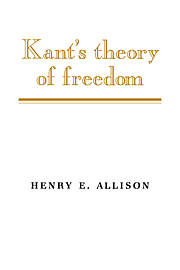Book contents
- Frontmatter
- Contents
- Acknowledgments
- Note on sources and key to abbreviations and translations
- Introduction
- Part I Freedom and rational agency in the Critique of Pure Reason
- Part II Moral agency and moral psychology
- 5 Rational agency and autonomy
- 6 Duty, inclination, and respect
- 7 Wille, Willkür, and Gesinnung
- 8 Radical evil
- 9 Virtue and holiness
- 10 The classical objections
- Part III The justification of morality and freedom
- Notes
- Bibliography
- Index
8 - Radical evil
Published online by Cambridge University Press: 05 June 2012
- Frontmatter
- Contents
- Acknowledgments
- Note on sources and key to abbreviations and translations
- Introduction
- Part I Freedom and rational agency in the Critique of Pure Reason
- Part II Moral agency and moral psychology
- 5 Rational agency and autonomy
- 6 Duty, inclination, and respect
- 7 Wille, Willkür, and Gesinnung
- 8 Radical evil
- 9 Virtue and holiness
- 10 The classical objections
- Part III The justification of morality and freedom
- Notes
- Bibliography
- Index
Summary
As indicated in the last chapter, the conception of Gesinnung cannot be understood fully apart from a consideration of the uses to which Kant puts it. Since the most explicit and best known of these uses is in the account of radical evil in Religion within the Limits of Reason Alone, the present chapter is devoted to an exploration of this difficult, yet intriguing, text. The discussion is divided into three parts. The first analyzes Kant's conception of radical evil and its connections with other features of his moral theory, particularly his rigorism. It also maintains that the roots of this conception are to be found in the Groundwork. The second considers the claim that there is a propensity (Hang) to evil in human nature and, therefore, that radical evil is universal. It argues that in spite of Kant's tendency to present it as an empirical generalization, this doctrine is best understood as a postulate of morally practical reason and, therefore, as a synthetic a priori claim. As such, it stands in need of a deduction, and the attempt is made to provide one for him. The third examines Kant's distinction between stages or degrees of radical evil and his claim that such evil is compatible with a good will. Its focal point is the connection between radical evil and self-deception.
- Type
- Chapter
- Information
- Kant's Theory of Freedom , pp. 146 - 161Publisher: Cambridge University PressPrint publication year: 1990



